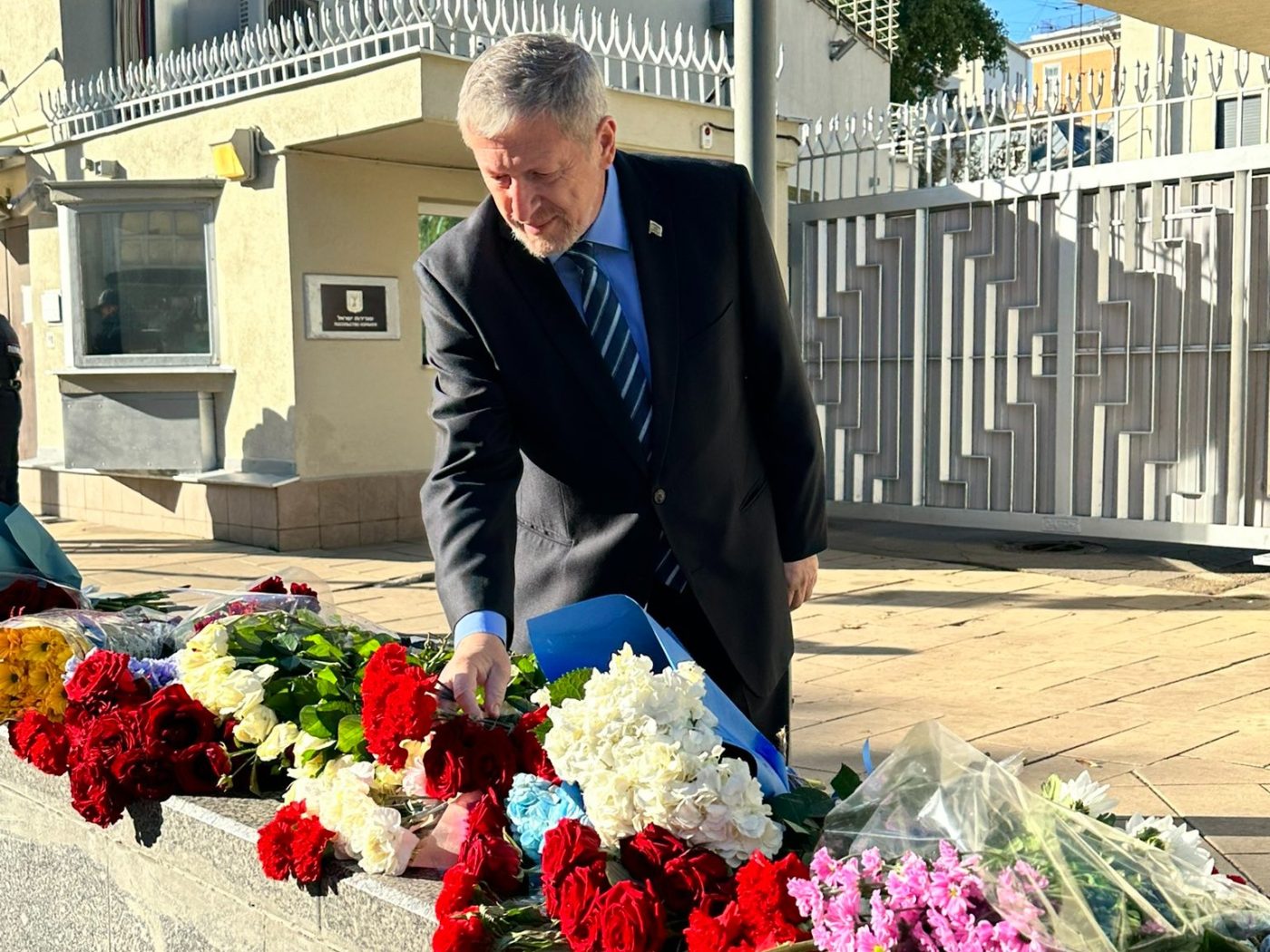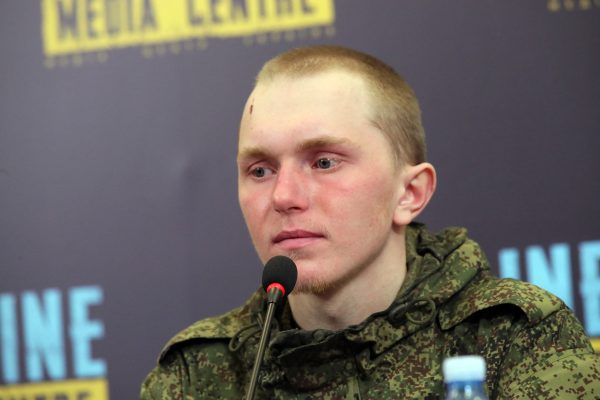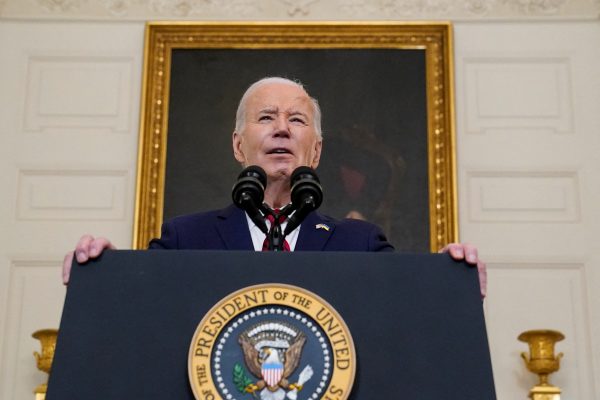The response of Russian state propagandists to the butchery of Israelis by terrorists has been morbidly jubilant; a reflection of the Kremlin’s cozy relations with groups including Hamas and Hezbollah, and countries like Iran and Syria.
Nonetheless, state media coverage is now starting to reflect a growing split within Russian society — with many supporting Hamas, even as others recoil in disgust over the carnage and in particular acts of butchery against Israeli civilians, including women, children, and the elderly.
The issue is perhaps starkest for the Kremlin’s most influential propagandist, Vladimir Solovyov, who has struggled to align his Jewish heritage with the outspoken, and sometimes gleeful, support of Hamas among his peers in the Russian media.
During the October 9 broadcast of his state TV program, The Evening With Vladimir Solovyov, the host complained: “This is hard for me. One of my acquaintances sent me a text message, saying ‘Long live the intifada!’ and talking about how great all of it is. I told him that while I know the history of this issue, and I can understand different points of view, I could never justify the people who do these kinds of things to women, children, and civilians.”
It was certainly a curious statement. Solovyov has been one of the fieriest advocates of hardline action against Ukraine and its people, up to and including the use of nuclear weapons both there and elsewhere in Europe.
Solovyov was keen to stress that despite his Jewish roots, his only loyalty was to Russia. And he has a point — his programs and guests have repeatedly highlighted the beneficial side effects that events in Israel might have for Moscow’s war against Ukraine.
Solovyov is not the only one struggling to maintain consistency as a result of events in the Middle East. Pro-Hamas commentators condemn Israel’s blockade of Gaza, while omitting any mention of Russia’s propagandists and military experts who have urged the total destruction of Ukraine’s energy infrastructure, in mid-winter, and advocate for Russia to cut off supplies of food and water, and to flood the streets of the Ukrainian cities with raw sewage.
Perhaps the contradictions are to be expected when the government is also visibly struggling. The Kremlin has declared its neutrality, with calls for both sides to cease the hostilities. Foreign Minister Sergey Lavrov said on October 9: “We cannot agree with those who say that security should be ensured exclusively by the fight against extremism and terrorism.” Which seems wholly at odds with innumerable official Russian statements since its full-fledged invasion of Ukraine began almost 20 months ago.
Many Russian propagandists have simply decided that the best course is to openly side with Hamas. Igor Molotov, RT’s Special Editor, penned a piece for a Belarusian state paper, Minskaya Prauda, rejoicing about the attack on Israel. The article was eventually removed, but an archived version is still accessible.
Molotov took credit for the idea that was recently promoted by the head of RT, Margarita Simonyan, suggesting that a thermonuclear bomb should be set off over Siberia. He wrote, “My name is Igor Molotov. It was I who advised detonating a thermonuclear bomb over Siberia. I apologize. It should explode over Israel.”
He recounted speaking with the Palestinian ambassador in Moscow, who reportedly told Molotov, “Igor, brother, this is our common victory.”
Molotov said: “The victory of Palestine in the occupied territories is a victory for Moscow and Minsk. Even if the Palestinian resistance does not win the deadly battle with Tel Aviv now, Palestinian flags will fly over the Al-Aqsa Mosque in Jerusalem. We have already won. Hamas and Fatah are marching along the same road to victory . . . Today, we are all Palestinians. Today, all of us are winning.”
During Monday’s broadcast of The Meeting Place on NTV, political scientist Maxim Yusin mentioned that it’s (allegedly) forbidden on Russian state television to describe Hamas as terrorists but asserted that he intended to do so anyway because they kidnap and murder women and children. Hosts Andrey Norkin and Ivan Trushkin then made the point for him, shouting down the panelist and repeatedly asserting that at the official level, Hamas is not considered a terrorist organization.
Yusin mentioned a growing divide in Russian society, estimating that roughly half the population supports Hamas and the other half favors Israel. State media employees veered off in various eccentric directions with a series of assertions on social media, including the statement that Israel’s inclusion of female soldiers explained the country’s lack of preparedness. The host of 60 Minutes, Olga Skabeeva, mocked the female soldiers for their social media posts preceding the invasion, because they were depicted dancing in their free time. Skabeeva posted the clips with a notation: “Here is how the Israeli army was getting ready for war.”
That at least fits with the Kremlin ideology. The number of women in the Russian military is tiny and has halved to fewer than 5% during Putin’s rule.
Julia Davis is a columnist for The Daily Beast and the creator of the Russian Media Monitor. She is a member of the Academy of Television Arts and Sciences, the Screen Actors Guild, and Women In Film.
Europe’s Edge is CEPA’s online journal covering critical topics on the foreign policy docket across Europe and North America. All opinions are those of the author and do not necessarily represent the position or views of the institutions they represent or the Center for European Policy Analysis.





